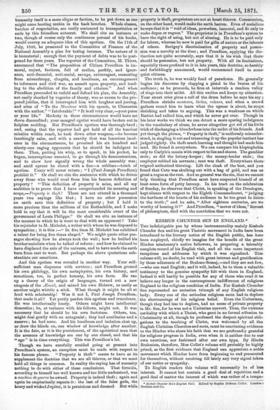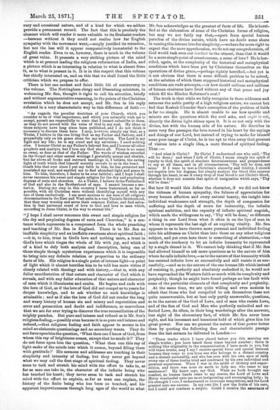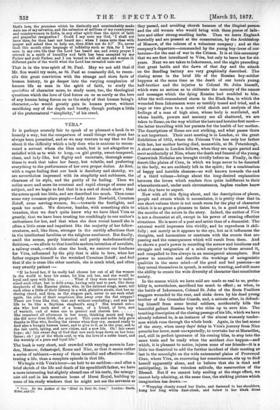KESHUB CHUNDER SEN IN ENGLAND.* THE indefatigable pen by whose
instrumentality mainly Keshub- Chunder Sen and his great Theistic movement in India have been introduced to the literary notice of the English public, has here- been employed, chiefly we imagine for the benefit of the great Hiudoo missionary's native followers, in preparing a tolerably _ complete record of his English visit, and all the more important receptions and addresses by which it was signalized. This volume will, no doubt, be read with great interest and gratification by those adherents of the Brahmo-Somaj,—and they are not few,. —who can read English; and it will, indeed, be to them a valuable- testimony to the genuine sympathy felt with them in England.. Indeed it will hardly be possible for any of those who read it to• believe any longer in the contemptuous indifference of religious. England to the religious condition of India. For Keshub Maunder- Sen represented no sectarian triumph of any English religious body. Every one of the orthodox religious sects had to deplore the shortcomings of his religious belief. Even the Unitarians,. though they had less to deplore, had no sense of private property in Mr. Sen, for he was not a Unitarian convert. Thus, the extreme- cordiality with which a Theist, who gave in no formal adhesion to- Christianity at all, though he professed the deepest spiritual obli- gations to the teaching of Christ, was welcomed by all the English Christian Churches and sects, must be convincing evidence to the Hindus who share his faith that we are profoundly grateful, for religious progress in India, even when it is neither due to our- own exertions, nor fashioned after our own type. By Hindu Bralamists, therefore, Miss Collet's volume will probably be highly prized, as the first evidence that England can appreciate a noble• movement which Hindus have from beginning to end prosecuted for themselves, without receiving till lately any very signal token. of our notice or sympathy.
To English readers this volume will necessarily be of less. interest. It cannot but contain a good deal of repetition and a good deal of matter the interest of which was rather of a tempo-
* Keehub Chunder Ben's English Visit. Edited by Sophia Dobson Collet. London Strahan and Co.
vary and occasional nature, and of a kind for which we seldom provide a permanent record. The fact that this is precisely the .element which will render it more valuable to its Brahmist readers —because without it they could not realize how far English sympathy with the movement went,—amply justified its retention, but not the less will it appear comparatively immaterial to the English reader. Even to us, however, there is much in the volume of great value. It presents a very striking picture of the mind which is at present leading the religious reformation of India, and a picture which is as interesting in relation to what is absent from it, as to what is present in it. It is in this respect that this volume has chiefly interested us, and on this that we shall found the little' criticism which we propose to offer.
There is but one modest and faint little bit of controversy in the volume. The Nottingham clergy and Dissenting ministers, in welcoming Mr. Sen, thought it right to call his attention, briefly and without argumentative reasoning, to the points of the Christian 'revelation which he does not accept, and Mr. Sen in his reply 'referred in a very characteristic way to this difference of faith :— " As regards the peculiar doctrines of your Church, which you
• consider to be of vital importance, and which you naturally wish me to -accept, permit me respectfully to state that I cannot subscribe to them, as they do not accord with the voice of God in my soul. My ideas on those subjects have long since been published, and I do not think it -necessary to discuss them here. I may, however, simply say that, as a Theist, I believe in the one living God as my Father and Saviour, and I -prayerfully rely on his grace alone for my salvation. The Lord is my light and my life ; he is my creed and my salvation ; I need nothing • else. I honour Christ as my Father's beloved Son, and I honour all other prophets and martyrs, but I love my God above all. There is no name so sweet, so dear as that of the Father. The words of wisdom recorded in the Gospel and other snored writings I gratefully accept and cherish, but far above all books and outward teachings is, I believe, the saving light of truth which God himself secretly reveals to us in the heart. I -thank him that ever since I put my faith in him, he has protected and nourished my soul, and enabled me to find abundant light and peace in 'him. To him, therefore, I desire to be ever faithful ; and I hope I shall never renounce his sweet and simple religion for the dry and perplexing -dogmas of sects and churches. As a Theist, I believe in the Fatherhood -of God and also in the Brotherhood of man. I cannot become a sec- tari,m. During my stay in this country I have fraternized, as far as possible, with all Christian sects without identifying myself with any ono of them exclusively. I am most anxious to see men of all religious denominations in the East and West unite in a vast Theistic Brotherhood, that they may worship and serve their common Father, and find salva- tion in that universal creed of love to God and love to man which, according to Jesus Christ, is the way to eternal life."
-"I hope I shall never renounce this sweet and simple religion for 'the dry and perplexing dogmas of sects and Churches," is a sen- tence which represents in a compressed form the whole preaching and teaching of Mr. Sen in England. There is to Mr. Sen an ineffable simplicity and an ineffable sweetness about spiritual faith ; —it is, to him, trust in God's love and nothing more, a trust in 'God's love which tinges the whole of life with joy, and which is of a kind to defy both analysis and description, being one of 'those simple though mysterious experiences which it is impossible to bring into any definite relation or proportion to the ordinary facts of life. His religion is a single point of intense light—a point -of light which it almost horrifies him to be told has more virtue if -closely related with theology and with history,—that is, with any fuller manifestation of that nature and character of God which it reveals, and with any fuller education of that nature and character of man which it illuminates and exalts. He begins and ends with the love of God, as if the love of God did not compel us to yearn for .deeper knowledge, and to ask whether no such knowledge is -attainable ; and as if also the love of God did not render the long and weary history of human sin and misery and superstition and -error and persecution and doubt and indifference, so marvellous that we are for ever trying to discover the true reconciliation of the 'mighty paradox. But pure and intense and refined as is Mr. Sen's religious feeling,—possibly even because it is so pure and intense and refined,—that religious feeling and faith appear to arouse in his mind no elaborate questionings and no secondary wants. They do not force upon him the question, ' What then can I know of God, from whom this ray of brightness comes, except that he sends it ?"rhey ,do not force upon him the question, What then can this ray of light make of the minds into which it comes, beyond filling them with gratitude ?' His sermons and addresses are touching in their simplicity and intensity of feeling, but they never get beyond what we may call the first stage of spiritual feeling. They never seem to task and stretch his mind with the effort to take in, as far as man can take in, the character of the infinite being who has touched his heart ; they never seem to task and stretch his mind with the effort to explain, as far as man can explain, the history of the finite being who has been so touched, and his apparent imperviousness through long ages of the world to what
Mr. Sen acknowledges as the greatest of facts of life. He is horri- fied at the elaboration of some of the Christian forms of religion, but may we not fairly say that,—apart from special human parodies of the divine nature, which have no doubt some share in causing this intense love for simplicity,—we have far more right to expect that the mere apprehension, we do not say comprehension, of God would task even our intellect to the utmost, than that it would be a mere simple point of consciousness, a sense of love ? He is hor- rified, again, at the complexity of the historical and metaphysical conditions which have been put by Christians themselves on the operations of divine grace,—perhaps rightly horrified,—but yet is it not obvious that there is some difficult problem to be solved, at the solution of which these supposed historical and metaphysical conditions are rude attempts,—or how should millions and millions of human creatures have lived without any of that peace and joy which fill the Hindoo Reformer's soul?
The truth is that while we fully recognize in these addresses and sermons the noble purity of a high religious nature, we cannot but feel that Keshub Chunder Sen's conception of the problem of faith is far too simple. He is almost unable to see how specific and minute are the questions which the soul asks, and ought to ask, directly the divine light shines upon it. It is so not only with the divine, but with the human side of his nature. He describes in some very fine passages the love roused in his heart by the sayings and doings of our Lord, but instead of trying to make for himself some poor image of Christ, he is too apt to thin away that greatest of visions into a single idea, a mere thread of spiritual feeling. Thus :- " And what is Christ ? By Christ I understand one who said, ' Thy will be done ;' and when I talk of Christ, I mean simply the spirit of loyalty to God, the spirit of absolute determinedness and preparedness to say at all times, and in all circumstances, Thy will bo done, not mine.' If I were to test a Christian's sincerity and fidelity, I should not inquire into his dogmas, but simply analyze the blood that courses through his heart, to see if every drop of that blood is not Christ's blood, whether it does not contain that spirit of resignation which says,' Thy will be done.' "
But how ill would this define the character, if we did not know the richness of human sympathy, the fulness of appreciation for every human affection and every natural beauty, the insight into individual weaknesses and strength, the depth of compassion for suffering and the depth of scorn for insincerity, the infinite spiritual ambition, and the capacity of infinite spiritual anguish, which made the willingness to say, Thy will be done,' so different a thing in our Lord from what it often is on the lips of men in whom it represents the last sigh of an expiring vitality. Mr. Sen appears to us to have thrown more personal and individual feeling into his addresses on Christ than into those on any other religious subject, and yet even here there is something of abstraction,—too much of the tendency to let an infinite humanity be represented by a single thread in it. We cannot help thinking that if Mr. Sen had allowed himself to ask more questions as to the nature of him whom he calls infinite love,—as to the nature of that humanity which has resisted infinite love so successfully and still resists it so suc- cessfully,—and as to the nature of the one human life which instead of resisting it, perfectly and absolutely embodied it, he would not have reproached the Western faith so much with its complexity and perplexity, though he might have found perhaps no less fault with some of the particular elements of that complexity and perplexity.
At the same time, we are quite willing and even anxious to admit that those who feel compelled to ask themselves these not quite unanswerable, but at best only partly answerable, questions, as to the nature of the God of Love, and of man who resists Love, and of the Son of God and Man who perfectly embodied and re- flected Love, do often, in their long wanderings after the answers, lose sight of the elementary fact, of which Mr. Sea never loses sight, and his incessant and tenacious hold of which gives him his great power. Nor can we present the nature of that power better than by quoting the following fine and characteristic passage from the last sermon he delivered in London :— "These truths which I have placed before you this morning are simple truths ; you have heard them times beyond number ; there is nothing like originality in the communication I have made to you, but still these truths, may I say ? receive special force and special interest because they come to you from one who belongs to a distant country and a distant nationality, and who has seen with his own eyes of faith every one of these truths tried and confirmed by his own individual and personal experience. When I was in the midst of idolatry and super- stition, and there was none on earth to help me, who came to my assistance? My heart says, my God. When no book brought me comfort, no human hands came to my rescue, the Lord of Love and Mercy vouchsafed unto me most invigorating and encouraging help ; in his strength I rose, I endeavoured to overcome temptations, and the Lord granted unto mo success. In my own life I saw the fruits of his care, and I could not continue a sceptic. Could I receive the asannum of
God's love, the promises which he distinctly and unmistakably made unto me of my salvation, and the salvation of millions of my countrymen and countrywomen in India, in any other spirit than the spirit of faith and prayerful resignation ? Could I say unto my God, ' I shall not have thee, for thou haat not heard me ; when I came unto thee with prayer and asked thee to help me, thou didst not do it?' No, never shall this month utter language of infidelity such as this, for I have seen in my own life that the Lord has heard me, and every prayer I uttered in a spirit of humility and faith has been accepted by my Father and your Father, and I am bound to tell all men and women in different parts of the world what the Lord has revealed unto me."
That is in the true spirit of St. Paul. May we not add that if Mr. San would try more, as St. Paul so constantly did, to recon- cile this great conviction with the strange and stern facts of human history, to go deeper into the varying complexion of human life as seen in the spirit of faith, to study the specialties of character more, to study more, too, the theological questions which the love of God forces on us as surely as the love of any human being forces on us the study of that human being's character,—he would greatly gain in human power, without sacrificing any of the depth and beartty, though perhaps a little of the preternatural "simplicity," of his creed.




































 Previous page
Previous page